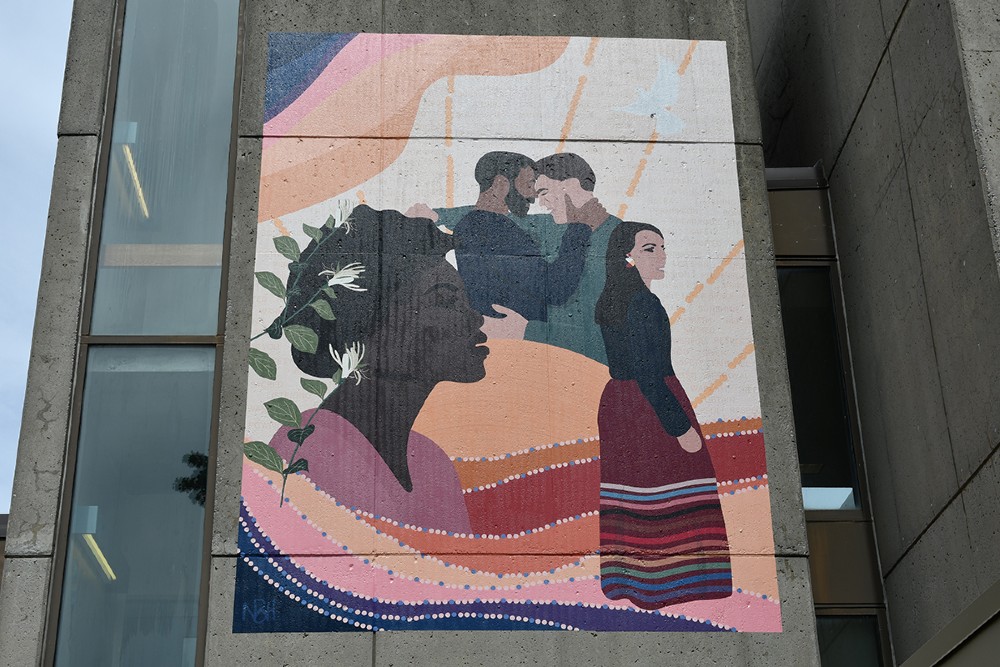Drawing attention to the issue of consent through art
September 23, 2021
Share

As members of the Queen’s community return to campus for the fall semester, they’ll notice that Harrison-LeCaine Hall isn’t quite as they left it. “A Love that Clings,” a new, almost four-meter-tall mural promoting consent, now graces the building and gives passersby on Bader Lane something to appreciate and contemplate. It was installed on August 23.
The project to bring a consent-themed mural to campus was initiated by students Maeve Avis Kozar and Megan Sieroka, co-chairs of Queen’s Consensual Humans, a student club founded in 2017 to promote the importance of consent in all areas of campus culture. The Human Rights and Equity Office/Sexual Violence Prevention and Response, the Alma Mater Society, and the Office of the Principal also helped make the mural a reality. It was designed by Queen’s fine arts student Niki Boytchuk-Hale.
“Consensual Humans has always believed art is one of the most powerful ways to raise awareness and start conversations. When the club was brainstorming ideas for projects to pursue, we decided a mural on a campus building would be the most effective way to bring the message of consent to the Queen’s community in an artistic way,” says Sieroka.
From the beginning, Sieroka and Avis Kozar envisioned a mural that would speak to the wide range of experiences and identities that make up the Queen’s community.
“One of the central ideas of Consensual Humans is that consent is a part of many aspects of life, not just sexual contexts. So we wanted to find a piece of art that speaks to that and that is inclusive in its representation,” says Avis Kozar. “And from the beginning we wanted to find a Queen’s student to design the mural.”
Sieroka and Avis Kozar released a call for submissions in March and formed a committee comprised of members of the university to evaluate the entries. The committee unanimously selected the submission from Niki Boytchuk-Hale.
For her design, Boytchuk-Hale wanted to include perspectives beyond her own. She sent around a survey to a group of students asking for their thoughts about consent and what they would like the mural to achieve. The several dozen responses she received influenced her final graphic design.
“I wanted this mural to be an uplifting celebration of consent that resonates with the Queen’s community,” says Boytchuk-Hale. “I hope it can brighten people’s days as they walk past it and also give them something to think about if they stop to look at it more closely.”
The mural is accompanied by an artist’s statement that explains the inspiration for and symbolism in the design.
“It is inspiring to see our students show such dedication and commitment to making their vision a reality, particularly when that results in a powerful work of art that conveys a critical message to our community,” says Principal Deane. “Consent is a topic of utmost importance on campus and I hope this new mural engages all those that view it in conversations about this issue.”
Learn more about the mural and about the Queen’s Consensual Humans Club on their website.
Sexual violence resources
There are a number of resources in place at Queen’s for students who have been affected by sexual violence, including Student Wellness Services, the Human Rights and Equity Office, and the AMS Peer Support Centre.
Any student in need of support is encouraged to contact Queen’s Sexual Violence Prevention and Response Coordinator, Barb Lotan, at bjl7@queensu.ca. For free 24/7 crisis support, students can also turn to Empower Me and Good2Talk. Faculty and staff can contact the Employee and Family Assistance Program.
Learn more on the Queen’s Sexual Violence Prevention and Response website.